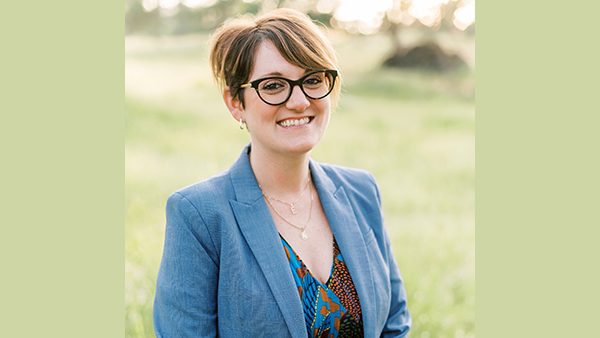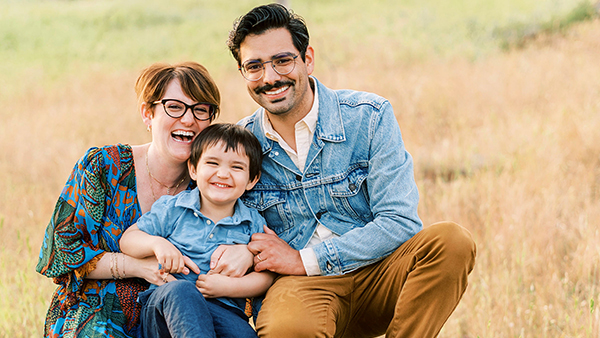|
We hope you enjoy this series where we meet and get to know employees from across campus. Would you like to be featured? Contact us at campusnews@csufresno.edu.
Name: Amila Becirbegovic
Title(s): Assistant professor of German and Ethnic Humanities and German Program Coordinator and Undergraduate Advisor
Department: Modern and Classical Languages and Literatures
Academic Degree(s):
- B.A. in German and Justice Studies, Arizona State University
- M.A. in German Literature and Culture, Arizona State University
- Ph.D. in German and Critical Theory, UC Davis
How long have you worked at Fresno State?
I have been here for five years now.
What is your most notable accomplishment in your field, and why was it important?
My work is inextricably bound up with my personal experiences as a genocide survivor and refugee. I was six years old when I escaped Prijedor, Bosnia. I saw firsthand the impacts of genocide and the generational trauma and memory politics associated with experiences of war. As a result, I have devoted much of my research and teaching to genocide education and representation. I have presented at numerous national and international conferences, teacher workshops and held seminars and talks on the topic.
As part of my research, I investigate how visual media affects our understanding of genocide and what potential media holds for mobilizing intervention in humanitarian crises. I was initially drawn to questions of alterity as a Bosnian refugee in Germany and have published on the entangled histories of Germany and Bosnian in international journals, as well as contributed to book chapters and reviews. At the core of my work, I seek to understand how contemporary generations remember and the role that media plays in post-WWII representations and cultural memory. I question who bears the responsibility for the memory of these atrocities and highlight the importance of historical entanglement, which serves as a continued reminder that our present moment is impacted by and wrapped up with the past.
What are you most passionate about in your field and why?
I am most passionate about empowering and educating the next generation of thinkers. I take great pride in educating students who go on to become artists, business owners, executives, doctors, teachers and advocates, contributing to society and making impactful social changes. I teach comparative genocide studies because most individuals know something about the Holocaust, even if it is riddled with misinformation, but they know very little or nothing about other genocides since WWII. This is a chance to teach them about countless other genocides since the Holocaust, as well as reinforce their historical understanding about WWII.
I use Bosnia to teach about tolerance, politics, why and how genocides start, but also about social media, international intervention and the role that our students can play even thousands of miles away from these cases. Knowing about the Holocaust and other contemporary genocide case histories makes us better global citizens and spreads awareness, tolerance and acceptance of difference. These are the skills that my students take into their vast and varied careers post-graduation.
What is a memorable moment you had at your job?
I think my most memorable moments are simply those times when I am connecting with my colleagues and students. I am fortunate to work with wonderful individuals and scholars and we are able to share ideas and give each other positive feedback. The conversations that I have with my department are meaningful and motivate me to be a better teacher. I am happy to hear when my students pose provocative and important questions, when they show their curiosity for the world and engage critically with difficult content. Those moments in the classroom with my students and in the hallways and offices with my colleagues are most meaningful and memorable.
What is a memorable moment you had in class, and what does that reveal about your teaching style?
I love being in the classroom. It is where I feel most comfortable and I enjoy seeing the small and large aha-moments and connections that students make on a daily basis. I think one of my most memorable moments was when a student found out that they got into a top graduate program in Germany during class. We had been working on the application material all year and were waiting on a response. The notification came in the middle of class and we were all there to support the students.
The beauty of studying a foreign language is that you build a cohort and students get to know each other over the course of several semesters. They grow together, learn a whole new language and struggle and succeed together. When the student got into this prestigious university the entire class cheered and it was a wonderful moment of community and shared joy. This moment also inspired other students to try and aim high and I have seen multiple students use their German language, history, cultural knowledge, their understanding of human rights and genocide studies to gain valuable and lifechanging career opportunities post-graduation. Seeing students succeed are always some of the most memorable and rewarding moments.
What is the most interesting or unusual job you've ever had?
I worked for T-Mobile, which happens to be a German company, for a few months. I worked at a large Asian-American center in a small, privately owned and licensed T-Mobile stall. The stall was positioned at the center of a market and overlooked aquariums with octopi and various fish, as well as a rotisserie duck station. I was the worst salesperson and spent most of my time helping immigrant workers at the market with their immigration paperwork and translating their mail and helping them with government forms. I was more interested in human rights and using my language abilities to help people than selling cell phones. I quickly moved on from that job, but I will never forget the connections I made with the individuals at the market.
What do you like to do for fun in your spare time?
I enjoy spending time with my family and playing dinosaurs with my 4-year-old son. Whenever I get the chance, I try to get outdoors and enjoy the many beautiful places and spaces that California has to offer. I am also developing a concept for a children’s book about genocide awareness through the lens of my own personal story as a child survivor and this process has been quite challenging and therapeutic.
What is something interesting about you that most people don’t know?
I speak seven languages and can understand and read several more.
Is there something else you would like to share that was not asked?
I would like to share one of my favorite German idiomatic expressions: "Friede, Freude und Eierkuchen". The phrase roughly translates to “Peace, Happiness and Pancakes” and is a fun reminder that we should lead a peaceful and joyous life and not to forget to enjoy the occasional treat along the way.
|



